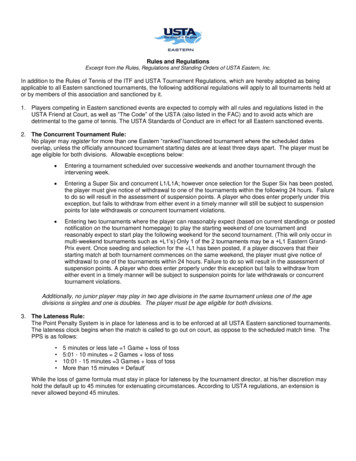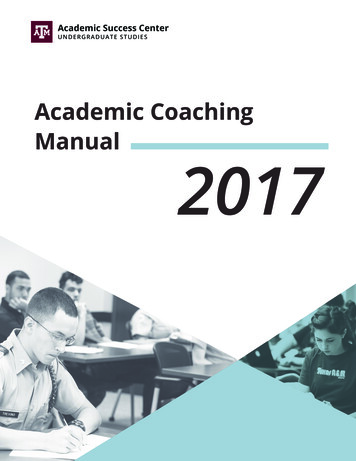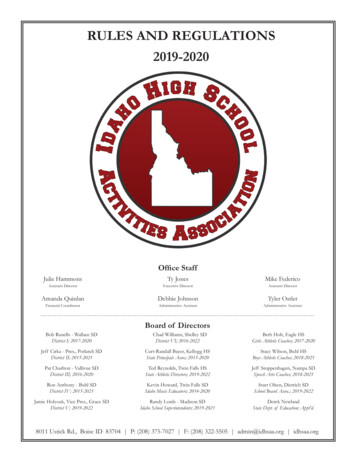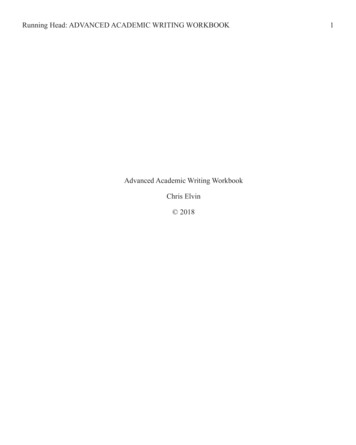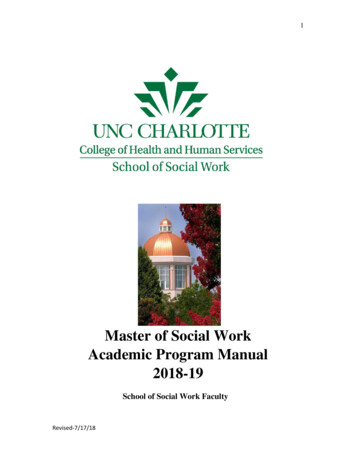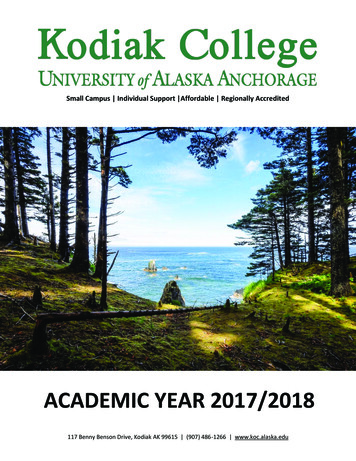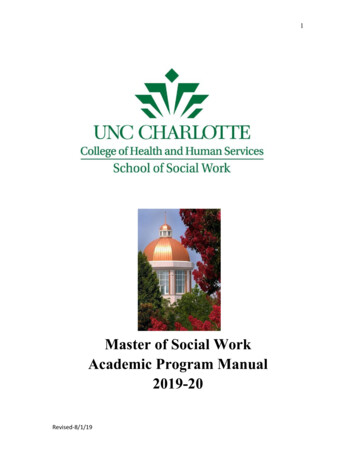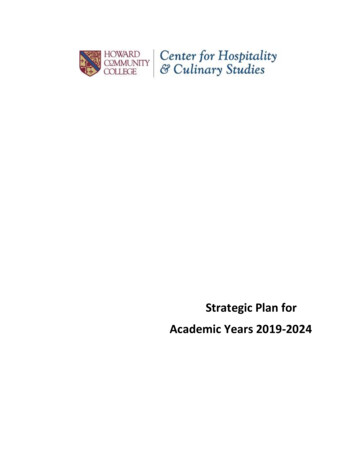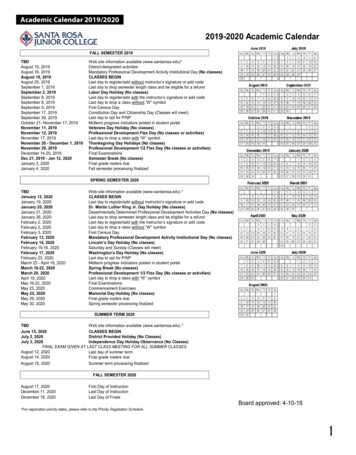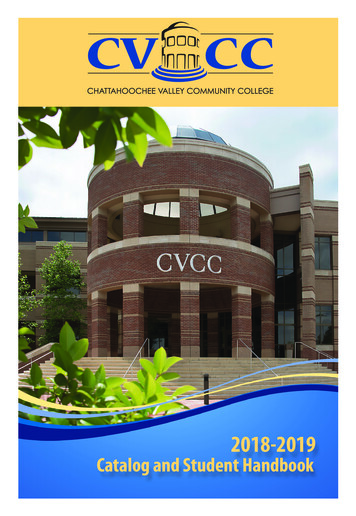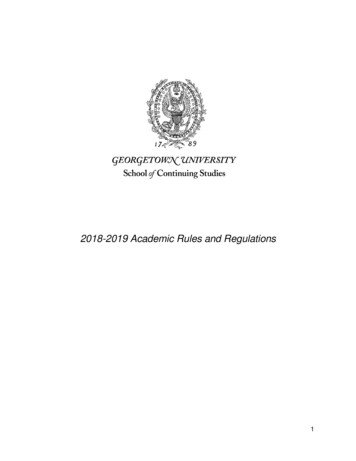
Transcription
2018-2019 Academic Rules and Regulations1
WelcomeUniversity Mission StatementSchool Mission StatementHistory of the School of Continuing StudiesJesuit Values at Georgetown University: The Spirit of GeorgetownAccreditation & Certification InformationDisclaimer, Website, and Update InformationOwner of InstitutionUniversity PoliciesOffice of Billing and Payment ServicesEducational Records PolicyEqual Opportunity and Non-Discrimination in EducationPolicy Statement on Harassment (Related to Protected Categories)Sexual Misconduct and Sexual HarassmentAccommodating Students’ Religious Observances PolicyThe Student Right-to-Know and Campus Security ActChange of AddressDirectory Information Disclosure PolicyEmergency Closures, Preparedness, and University SafetyHOYAlertAcademic Integrity & Student ConductThe Georgetown University Honor Code and SystemHuman Subjects ResearchStudent Conduct, Civility, and EngagementProgram Enrollment & Course RegistrationTechnology Skills RequiredTechnology Equipment RequiredTransfer 020Bachelor of Arts in Liberal Studies20Master of Arts in Liberal Studies, Master of Professional Studies, Executive Master ofProfessional Studies, and Doctor of Liberal Studies21Transfer Credit through the Consortium (MPS & BALS)Advanced Standing (DLS Program Only)Waiver Requests: MPS Foundation CoursesStudent Responsibility for Degree PlanningInternships and On-Site Practical Experiences for CreditTravelling for Study Tours, Residencies, and Other Georgetown Sponsored EventsCourse Modalities (On-Campus & Online Courses)Academic Calendar23242425252626292
Student Responsibility for Registration DecisionsStudent Enrollment StatusPart-Time Student StatusFull-Time Student StatusRegistration HoldsWaitlistPersonal Leave of AbsenceMedical Leave of AbsenceMilitary: U.S. Armed Forces LOA Request, Return, and Re-EnrollmentSatisfactory Academic Progress (SAP) for Financial AidWithdrawalCourse WithdrawalProgram WithdrawalCompassionate WithdrawalSCS Academic CouncilDegree Time LimitsAcademic OverloadRe-Admission after Prior AttendanceRe-Enrollment after Prior AttendanceTermination and Dismissal AppealsGrades & GradingUndergraduate Grading SystemGraduate Grading SystemGrading ScalesCourse Syllabi and Grading CriteriaIncomplete Grades and DeadlinesRepeating a CourseCourse Grade Changes and Time LimitsCourse Grade AppealsAcademic StandingBachelor of Liberal Arts Academic StandingProfessional Studies Academic StandingMaster of Liberal Arts Academic StandingDoctor of Liberal Studies Academic StandingDegree ConferralGraduation ApplicationCommencementAcademic Awards and HonorsFinancial 24242434343464747494950515253535454553
WelcomeWelcome to Georgetown University and the academic programs in the School of Continuing Studies(SCS): Bachelor of Arts in Liberal Studies (BALS); Master of Arts in Liberal Studies (MALS); Master ofProfessional Studies (MPS); Executive Master of Professional Studies (EMPS); and Doctor of LiberalStudies (DLS).Students should familiarize themselves with all of the rules, regulations, and procedures relevant topursuing a degree at SCS and attendance at Georgetown. In addition to information in this handbook,students are responsible for adhering to all policies set forth by their academic program, as well asUniversity regulations including but not limited to: registration, withdrawal, and refund deadlines, theHonor System, the Code of Student Conduct. Students in the BALS program must also adhere to theguidelines set forth in the Undergraduate Bulletin (https://bulletin.georgetown.edu/scs).Unawareness of these rules will not be accepted as an excuse for failure to act in accordance with them.Students should seek clarification from their academic advisors regarding any policies or regulations theyhave questions about.Sincerely,The Office of Academic Affairs and ComplianceUniversity Mission StatementGeorgetown is a Catholic and Jesuit, student-centered research university. Established in 1789 in thespirit of the new republic, the university was founded on the principle that serious and sustained discourseamong people of different faiths, cultures, and beliefs promotes intellectual, ethical and spiritualunderstanding. We embody this principle in the diversity of our students, faculty and staff, ourcommitment to justice and the common good, our intellectual openness and our international character.An academic community dedicated to creating and communicating knowledge, Georgetown providesexcellent undergraduate, graduate and professional education in the Jesuit tradition for the glory of Godand the well-being of humankind. Georgetown educates women and men to be reflective lifelonglearners, to be responsible and active participants in civic life and to live generously in service to others.School Mission StatementTo deliver a world-class, values-based education to a diverse array of communities and individualsthroughout their academic and professional careers; to improve employability and develop workforces;and to contribute to building a civic-minded, well-informed, and globally aware society.History of the School of Continuing StudiesThe School of Continuing Studies (SCS) at Georgetown was founded in 1956 as the GeorgetownUniversity School for Summer and Continuing Education (SSCE). In the summer of 1974, Liberal Studies,the oldest degree program within the School, was launched by Joseph Pettit, the Dean of the SSCE atthe time. The Bachelor of Arts in Liberal Studies (BALS) and the Master of Arts in Liberal Studies (MALS),each graduated our very first student (one in each program) in May 1978. The Doctor of Liberal Arts4
(DLS) program began in fall 2005, and the first Doctor of Liberal Studies (DLS) student graduated in May2010.The Master of Professional Studies (MPS) and Executive Master of Professional Studies (EMPS)programs, emphasizing a balance of theoretical and applied learning, began in Fall 2007 with majors inPublic Relations & Corporate Communications and Journalism. Our first group of MPS students, 14 total,graduated in Fall 2008. MPS majors in Sports Industry Management and Real Estate began in Fall 2008;Human Resources Management in Spring 2009; Technology Management in Fall 2009; Urban &Regional Planning, and Emergency & Disaster Management in Fall 2013; Hospitality Management andSystems Engineering Management in Fall 2014; Integrated Marketing Communications and GlobalStrategic Communications in Fall 2015; Project Management in Spring 2016; Applied Intelligence in Fall2017; Higher Education Administration and Design Management & Communications in Fall 2018. OurMPS alumni community has grown considerably with over 2,000 graduates from all programs since theirinception.For over 50 years, SCS has fulfilled Georgetown University's mission of educational outreach andinclusivity by offering a wide range of educational options to a diverse community of students andprofessionals. Our School offers more than 600 courses, undergraduate and graduate degrees,customized education, special programs, and much more.Jesuit Values at Georgetown University: The Spirit of /thespiritofgeorgetownBy its very definition as a Jesuit school, Georgetown is an inclusive community that welcomes studentsand faculty members from all backgrounds. In the words of Father Philip Borroughs, former VicePresident for Mission and Ministry at Georgetown, “Because we respect the wide variety of religious andhumanist perspectives of our colleagues, we often describe ourselves as a 'centered pluralism.' In otherwords, as we cherish Catholic and Jesuit identity which centers this great University, we also respect andengage the plurality of traditions which are held by members of our community.”Students are encouraged to familiarize themselves with the core values that define the University. Weunderstand and appreciate that some of these values will resonate more directly with some students thanothers; however, our hope is that our students will endeavor to find ways to incorporate these values intotheir academic experience as they deem appropriate and practical.The following text is quoted directly from the website listed above: A Jesuit institution, Georgetown isgrounded in a 450-year-old educational tradition inspired by St. Ignatius of Loyola, the founder of theSociety of Jesus. Today, as a consequence of this long tradition, we can identify a number ofcharacteristics or values that inspirit our University and that are referred to in our University MissionStatement, our institutional documents, and our iconography.The following values and definitions will help you to understand what makes Georgetown such an invitingand distinctive educational community. And just as Bishop Carroll welcomed Georgetown students fromvarious religious and cultural backgrounds, we hope that whatever traditions you bring to this Universitycommunity, you will find here values that you can appropriate in your own distinct way."Ad Majorem Dei Gloriam" (For the Greater Glory of God), the motto of the Society of Jesus, appearsover the entrance to Wolfington Hall, the Jesuit Residence on campus, and above the stage in Gaston5
Hall. This motto identifies the religious purpose of all Jesuit endeavors. It is not simply doing good thatJesuits propose, but rather doing what will better or more effectively reveal God's active presence in ourwork and in our world. Discerning what is better is always an important principle of Jesuit decisionmaking.Contemplation in Action St. Ignatius believed that prayer and reflectivity should so guide our choices andactions that our activity itself becomes a way of entering into union with and praising God. Contemplationis a critical dimension of the spiritual life and it is reflected in Georgetown's commitment to prayer,worship and retreats. Analogously, in the academic life, a spirit of reflectivity is a critical aspect ofintellectual inquiry.Academic Excellence In 1547, the first Jesuits were invited to begin a college in Messina, Italy, so that theyoung men of that town could receive the same quality of education that the early Jesuits promoted intraining their own. Georgetown University is a descendant of this original Jesuit commitment to education.Academic excellence describes the great importance that Jesuits have placed on the life of the mind as ameans for uncovering truth and discovering meaning. Georgetown's emphasis on academic excellence isreflected 26 in the careful selection of faculty and students, the quality of teaching and the importance ofresearch on our campus, and it has led to our recognition as one of the top 25 universities in the UnitedStates.Educating the Whole Person St. Ignatius believed that God could be discovered in every humanendeavor, in every facet of learning and experience, and in every field of study. Consequently, hepromoted the development of the spiritual, intellectual, artistic, social and physical aspects of eachperson. Georgetown's commitment to educating the whole person is evident in our strong corecurriculum, our wide array of academic programs and our commitment to athletic, living-learning andreligiously-centered communities."Cura Personalis" This Latin phrase translates as "Care of the Person," and originally was used todescribe the responsibility of the Jesuit Superior to care for each man in the community with his uniquegifts, challenges, needs and possibilities. This value now is applied more broadly to include therelationship between educators and students and professional relationships among all those who work inthe University. "Cura Personalis" suggests individualized attention to the needs of the other, distinctrespect for his or her unique circumstances and concerns, and an appropriate appreciation for his or herparticular gifts and insights.Faith and Justice In 1965, following the 31st General Congregation of the Society of Jesus, the Jesuitsmade a significant institutional commitment to "the service of faith and the promotion of justice." Thiscommitment links the authentic following of the Gospel of Jesus with an obligation to address the socialrealities of poverty, oppression and injustice. While not all members of the Georgetown community wouldbase their commitment to justice on these religious principles, our institutional commitment to promotejustice in the world grounds our Center for Social Justice Research, Teaching and Service, and inspiresnumerous University projects with the underserved.Women and Men for Others Fr. Pedro Arrupe, S.J., Superior General of the Society of Jesus from 1965 to1981, employed the phrase "Men for Others" in a notable 1973 presentation in Valencia, Spain. FatherArrupe provocatively challenged the alumni of Jesuit schools and universities to be engaged in thestruggle for justice to protect the needs of the most vulnerable. Today, this phrase has become moreinclusive and its spirit is evidenced in Georgetown's promotion of service-learning; our local, national andinternational service projects; and the impressive commitments of our graduates to serve in organizations6
such as the Jesuit Volunteer Corps and the Jesuit Volunteer Corps International, Teach for America, andthe Peace Corps.Interreligious Understanding Reflecting themes from the Second Vatican Council, the 34th GeneralCongregation of the Society of Jesus made a significant commitment to ecumenical and interreligiousengagement and understanding. As the Georgetown University community comprises a wide variety ofreligious traditions, our Office of Campus Ministry supports Roman Catholic, Protestant, Orthodox, Jewishand Muslim chaplaincies, a variety of affiliated ministries, and numerous ecumenical and interreligiousevents and services. In addition, the University sponsors the Prince Alwaleed Bin Talal Center for MuslimChristian Understanding the Program for Jewish Civilization; the Berkley Center for Religion, Peace, andWorld Affairs; the Catholic Studies Program; and a partnership with the Woodstock Theological Center.Community in Diversity As a Catholic and Jesuit University, the Georgetown community welcomes andsustains rich diversity among our students, faculty and staff. Approximately 52 percent of our studentbody are women, 22 percent of our undergraduate students are from a minority ethnic background, andover 2,000 students, faculty and researchers come from 130 foreign countries. The University supportsthe diversity of our community through a variety of resources that include the Diversity Action Council, theCenter for Minority Educational Affairs, the Patrick F. Healy Fellows Program, the LGBTQ ResourceCenter and a wide array of student cultural and performance groups. These values are central to theidentity of Georgetown University, and each generation of students, faculty and staff is invited to engagethem in ways that sustain our Jesuit character.Accreditation & Certification InformationGeorgetown University is accredited by the Commission on Higher Education of the Middle StatesAssociation of Colleges and Schools, 3624 Market Street, Philadelphia, PA 19104, 215-662-5606. TheCommission on Higher Education is an institutional accrediting agency recognized by the U.S. Secretaryof Education and the Council for Higher Education Accreditation.The Commission is recognized by the U.S. Secretary of Education for accrediting activities in the MiddleStates region, which includes the District of Columbia, Delaware, Maryland, New Jersey, New York,Pennsylvania, Puerto Rico, and the U.S. Virgin Islands. Institutions based outside of the United States,whether or not chartered or licensed within the Middle States region, may not make reference to theCommission's recognition by the U.S. Secretary of Education. Any reference to accredited status may notimply that the Secretary's recognition of the agency extends to foreign institutions.Disclaimer, Website, and Update InformationThis Handbook is published for current and prospective SCS students for the programs contained here. Itis not a contract or an offer to contract. Updates to certain policies and procedures may be necessary tothe Handbook during your studies, and all students will be held to the most current academic standardsand regulations of SCS and their programs. Changes to major policies are proposed, reviewed, andapproved, as appropriate, by the SCS Executive Committee, the Academic Council, and the Office ofAcademic Affairs & Compliance. We therefore encourage students to check our Student Handbook andPolicy web page at the start of each semester to download the most recent Handbook for that academicterm and to read about academic and non-academic policies that affect all students in the School and atthe University. The most recent edition of the Handbook and links to important policies and procedurescan be found at: nts/student-handbooks/.7
While every effort is made to contain costs and achieve economies, Georgetown specifically reserves theright to increase tuition or other fees without prior notice. The University and School further reserve theright to advance the requirements regarding admission, to change the arrangement of courses, therequirements for graduation or degrees, and other regulations affecting the student body. Suchregulations may govern current and new students and will be effective whenever determined by theparticular School involved or by general University directive.It is the responsibility of the student to keep well-informed with respect to the regulations andrequirements in this Handbook as well as separate policies and procedures established by otherUniversity Offices (such as the Registrar’s Office, Financial Aid, Billing and Payment Services, and theOffice of Global Services) which may affect the student.Owner of InstitutionGeorgetown University is a private not-for-profit, congressional chartered institution of higher educationlocated in Washington, DC. As a private corporation, Georgetown University is governed by thePresident and the Board of Directors. The names of the Board of Directors for Georgetown University arelisted on the University’s website: /index.htmlUniversity PoliciesOffice of Billing and Payment ServicesResponsibilities of the Office of Student Billing & Payment ServicesThe Office of Student Billing & Payment Services (OSBPS) is responsible for accurateassessment of charges to students’ accounts, timely issuance of billing statements andprocessing of payments to Georgetown for charges assessed to students’ accounts, and forrefunding overpayment of students’ accounts in accordance with Georgetown policy and federallaw. Students and individuals authorized by students to access student account information maycontact the OSBPS by phone at 202-687-7100 or by email at studentaccounts@georgetown.eduand can expect a response within two business days.Responsibilities of StudentsBy the act of registration, class attendance, or participation in other activities associated withenrollment at Georgetown, the student accepts financial responsibility for charges assessed tohis/her student account. Charges include those for tuition, mandatory fees, room, board, andfines (such as late payment penalties, library fines, and fees associated with the cost of collectionin the event of a delinquency, among others). This financial responsibility is not relieved untilpayment has been made for any and all charges incurred.Billing and Due DatesGeorgetown University does not issue paper bills. Electronic copies of the student bill areperiodically posted online. Upon the issuance of a new bill, an email will be sent to the preferredemail address on file (by default, this will be the student's Georgetown email address), as well asto th
Re-Admission after Prior Attendance 39 Re-Enrollment after Prior Attendance 40 Termination and Dismissal Appeals 41 Grades & Grading 42 . Georgetown is a Catholic and Jesuit, student-centered research university. Established in 1789 in the spirit of the new republic, the university wa

